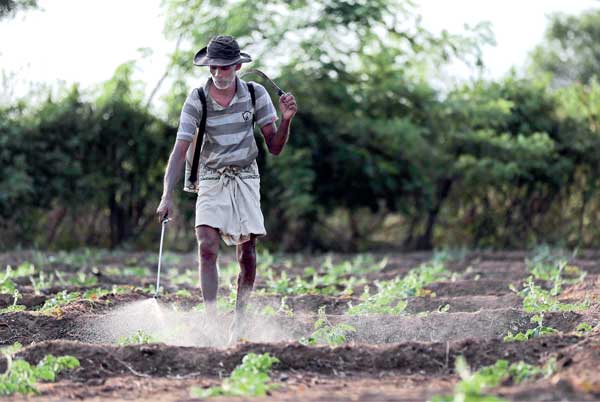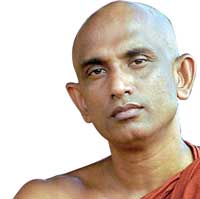Reply To:
Name - Reply Comment
Last Updated : 2024-04-19 05:46:00

The banned chemical Glyphosate made headlines recently as Minister of Plantation Industries Navin Dissanayake ruffled a few feathers addressing the Annual General Meeting of the Planters’ Association of Ceylon held last month. The Minister said the government was likely to allow importing 800,000 litres of the banned weed killer Glyphosate essential for tea plantations over the next few months. “I am sure, maybe in two or three months I can have a formula in place” the Minister was quoted as saying.
 The Minister had also noted that discussions with the Head of State was underway to negotiate the import of Glyphosate for the ailing tea industry, which would however be in violation of President Maithripala Sirisena’s plans for a toxin-free nation.
The Minister had also noted that discussions with the Head of State was underway to negotiate the import of Glyphosate for the ailing tea industry, which would however be in violation of President Maithripala Sirisena’s plans for a toxin-free nation.
The Daily Mirror contacted Minister Naveen Dissanayake to clarify on the matter. “There has been no decision to lift the ban, I have only requested an exemption to be granted for the tea industry where only the required 800,000 litres will be imported for the tea industry” Minister Dissanayake explained. The Minister said that discussions were held with concerned parties who have opposed the move, including Ven. Athuraliye Rathana Thera, a strong supporter of the ban. “Both the President and the Prime Minister were briefed on the situation. The Policy on the ban on Glyphosate will not change. We are simply asking for an exemption” the Minister said.
Asked of the nature of this import formula, the Minister said the import volumes would be brought down over the period of three years, until the tea industry adapts to the situation brought forth with the ban, with a 15% reduction each year. Referring to health concerns surrounding the banned chemical, the Minister noted that scientific evidence was very much in favour of Glyphosate when used in a safe manner.
Speaking to the Daily Mirror the Secretary to the Ministry of Plantation Industries Upali Marasinghe said that while the Ministry has no authority to import the banned chemical it had been lobbying for the substance to be imported in an effort to save tea plantations. “The Ministry made a formal request to the government to allow the importation of Glyphosate about a month ago. However, the government has not indicated a change in its stance and it is unlikely that will change” Marasinghe said.
 Head of the Department of Pharmacology, Faculty of Medicine at the Rajarata University Dr. Channa Jayasumana is of the opinion that the Registrar of Pesticides, the regulatory authority for pesticides never implemented the ban on Glyphosate effectively.
Head of the Department of Pharmacology, Faculty of Medicine at the Rajarata University Dr. Channa Jayasumana is of the opinion that the Registrar of Pesticides, the regulatory authority for pesticides never implemented the ban on Glyphosate effectively.
“As far as I can see, the Registrar of Pesticides never took proper action against the importation of Glyphosate. Instead they supported this. The duty of the Registrar of Pesticides is to protect Sri Lankan citizens from the consumption and use of harmful chemicals. To the contrary they do their best to try and lift the ban against Glyphosate.
Dr. Jayasumana is no stranger to opposing views. He remains firm in his stance that Glyphosate is a killer in disguise. In fact he has accumulated a number of adversaries owing to his research findings against the chemical. These individuals and groups including scientists and academics have called for a review of the ban claiming that the ban was instigated by a hypothesis published by a few Sri Lankan scientists that it may play a role in chronic kidney disease of uncertain aetiology, (CKDu) the deadly disease plaguing the North Central Province.
The WHO-Presidential Taskforce Joint International Consultation on CKDu (April 2016) with the participation of 54 local and international experts concluded that there is no evidence to implicate any agrochemical as the cause of the disease. Several academics and scientists argue that Glyphosate is equally used in other areas of the dry zone with similar agricultural practices and in plantations and other crops in the wet and intermediate zones where No CKDu is reported. Another reason cited by the group is that the ban already has resulted in serious repercussions on the entire agriculture industry, in particular the tea industry, in the absence of an alternative effective weed killer.
Meanwhile, the local arm of an international group is promoting the import of Glyphosate which believes that the increasing demand for the chemical was hyped up as overuse. The organisation consists of 28 member companies operating here and has presented their arguments that the use of Glyphosate was negated by those with vested interests. According to this group the WHO funded research on CKDu was misinterpreted and scientists who presented correct scientific facts were labelled as agents of Agrochemical companies.
Countering this argument, Dr. Jayasumana reiterates that Glyphosate is a carcinogen identified by the WHO. “This is an embarrassment. How can these individuals with no medical knowledge ascertain if Glyphosate is not a cause for these illnesses? Most of the individuals making these claims are retired and not even doctors. We make our assertions with research which were published in renown journals” Dr. Jayasumana passionately argued.
Dr. Jayasumana also makes an important observation that none of the signatories of a letter to the President urging the ban to be lifted, participated in the WHO-Presidential Taskforce Joint International Consultation on CKDu held in April this year. “I was an invited participant to this event. There is no conclusive evidence that this particular chemical is responsible for the disease. But that is because we do not have sufficient human data. Who will volunteer to give researchers human data to explore this matter further?” Questions Dr. Jayasumana.
“This doesn’t mean that the chemical is not linked with the disease. There is sufficient evidence.” Dr. Jayasumana opined reiterating his belief that the media are portraying a polarised version of the campaign against Glyphosate.

The Daily Mirror also contacted Ven. Athuraliye Rathana Thera who has been a vocal supporter of the ban on the use of Glyphosate in the country. The prelate at a recent press conference held in Colombo also noted that the government was changed by its citizens in order to secure its future and not allow vicious corporations back in the country. The prelate further said Minister Dissanayake had no right to make statements over the ban disregarding the Cabinet of Ministers.
While Sri Lankans are campaigning for a toxin free nation, globally an increasing number of activists are taking the bull of harmful agrochemicals by its horns. The Monsanto Tribunal is one such international civil society initiative attempting to evaluate allegations made against industrial agriculture giant Monsanto, with regards to damage caused to the environment and human health.
The event was held at The Hague between the 14th -16th of this month, organised by a global group of professionals, scientists and environmentalists to take on the global GMO seed giant Monsanto. The steering committee of the crowd funded group includes vociferous activists Vandana Shiva, Corinne Lepage, Olivier De Schutter and Andre Leu, all of whom have been unapologetically critical of the dangers posed by industrial agriculture. While many have criticised the group for their individual and collective work, the steering committee explains that the trial was used to assess whether or not Monsanto could be eligible for criminal proceedings, as the first step to prosecution in the future.
The steering committee also includes French journalist Marie-Monique Robin who is known for her documentaries ‘Our Daily Poison’ and the ‘World According to Monsanto’ covering the history, hidden agendas and controversies of the multinational. Robin with over 25 years of investigative journalism under her belt visited the island recently where she attended a media briefing, prior to which she had also obtained video footage for her documentaries during her tour of the North Central Province. She collects evidence travelling to far corners of the world in a bid to rid communities of dangers posed by chemicals. She also urged concerned parties in Sri Lanka to support her cause. Ven. Athuraliye Rathana Thera confirmed to the Daily Mirror that, he too will support her cause and attend the tribunal at the Hague.
Eminent Judges heard testimonies from victims worldwide and delivered an advisory opinion following procedures of the International Court of Justice. Dr. Channa Jayasumana, was also invited to this event by the International Institute of Social Studies (ISS) of Erasmus University Rotterdam to present his case on Sri Lanka, where it was supported by a local farmer from Panama. Similarly the citizen’s tribunal heard the cases of numerous researchers like Dr. Jayasumana in order to lay the groundwork in tackling the agriculture giant.
The tribunal however is not governed by or affiliated with the United Nations nor the International Criminal Court.
The People’s Assembly concluded on October 16, World Food Day, with a global citizens pledge to transition to a healthy and regenerative, and socially and economically just and democratic global food and farming system.
Subjecting Monsanto and other big names to real legal consequences would be a challenge, though, as the corporation has never lost a case. Yet there is hope that it would be the foundation of a worldwide movement against chemically enhanced foods.
 While there are two opposing factions debating the use of Glyphosate those who endorse its import are supported by a group of former heads of the Department of Agriculture. It is commendable that despite their retirement their interest lies in the resurrection of the agricultural industry of the country. Nevertheless it is also questionable that these groups are seemingly less empathetic or cautious of protecting human life from the potential harms of threatening chemicals.
While there are two opposing factions debating the use of Glyphosate those who endorse its import are supported by a group of former heads of the Department of Agriculture. It is commendable that despite their retirement their interest lies in the resurrection of the agricultural industry of the country. Nevertheless it is also questionable that these groups are seemingly less empathetic or cautious of protecting human life from the potential harms of threatening chemicals.
We would like to note that Multinational personalities are certainly operative in Sri Lanka actively publicising the evils of restricting Glyphosate imports. It is also noteworthy that the National Academy of Sciences Sri Lanka, the premier academic body for senior scientists in the country has distanced itself from the controversial research findings linking agrochemicals to CKDu.
While the body has said there is no conclusive evidence to establish the link, it has tabled the need for immediate action to prevent the spread of CKDu. One of these suggestions is educating farmers on the dangers of indiscriminate use of agro- chemicals and providing them with training on the proper use of chemicals. Relevance to CKDu aside, agrochemicals are inherently harmful to the human body and its necessity debatable. It is certainly baffling as to why policy makers would recommend its import.
They say you cannot live until you learn to survive, but will we survive to see our tea estates and paddy fields prosper if we expose our cultivators to chemical intensive plantations and cultivations?

Add comment
Comments will be edited (grammar, spelling and slang) and authorized at the discretion of Daily Mirror online. The website also has the right not to publish selected comments.
Reply To:
Name - Reply Comment
On March 26, a couple arriving from Thailand was arrested with 88 live animal
According to villagers from Naula-Moragolla out of 105 families 80 can afford
Is the situation in Sri Lanka so grim that locals harbour hope that they coul
A recent post on social media revealed that three purple-faced langurs near t